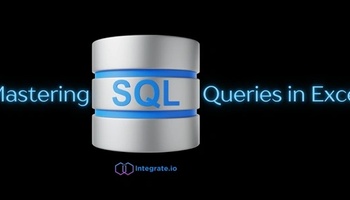As a business owner, you know that data management is critical. Data can be used for many things: to improve customer relationships and retention, increase sales opportunities, or create new products. The problem is that managing data can take up hours each day, eating into valuable time that could be spent on other tasks. Fortunately, there are tools out there to help automate your data management processes. This post will discuss how automation can save your business time and make your life easier.
What is Data Automation?
Data automation is the concept of taking manual tasks and processes, usually done by humans, and using software to automate them. This does not mean that all data management will be replaced with software, but it could certainly help streamline some steps in your existing process. For your ETL/ELT pipeline, an excellent example of this could be extracting, transforming, and loading your data from different sources into one location. This process can take hours each day as you identify connections between the various databases. Having automation in place will allow those steps to run independently without any human interaction, saving your team time for other tasks requiring more attention.
What are Automated Data Management Tools?
Data management automation handles information in many ways, including:
Data Quality
Cleaning up or improving the quality of data, for example, by matching customer records from multiple sources.
Data Integration
Combining disparate datasets into a central location. For example, combining online and offline sales information in one place to track out what campaigns are working best to drive traffic and conversions. Data synchronization can also be done between two databases that may not have a defined relationship, such as an eCommerce platform tracking inventory levels when orders are placed with another system managing warehouse stock levels.
Automated Reporting
Use pre-configured reports that monitor your business's key performance indicators.
Profiling, cleaning, linking, and reconciling data with a master source, a standard for formatting master data or the data to do business. In addition to making corrections to the data, these algorithms ensure organizations keep to well-defined rules and have logs detailing the processes used to make the data consumable.
Metadata Management
Handle the various data descriptions, for example, a database schema that defines how tables are organized and what fields those tables contain. It also includes information on where to find particular data within different databases and any relationships between these elements.
Master Data Management
This is a process that facilitates the flow of accurate information to all parts of an organization. The goal is to have one version of truth for each data set so that everyone can access clean and consistent datasets within their business functions. This could include customer records or product catalogs which can be managed through automation rather than duplication across multiple systems by different teams in your company.
Know the Business Reasons for Automating Data Management
Businesses improve efficiency with automation, but it is essential to focus on tasks with a higher return on investment. Within Data Management, this might be uses cases such as:
Customer Segmentation
Automated data management allows for multiple sources of customer information to link together and then segment into groups. This helps companies personalize their marketing efforts more efficiently by targeting customers most likely to purchase products or services based on their characteristics instead of general demographics.
Enhanced Customer Relationship Management
By improving your ability to provide personalized service, you can increase loyalty among existing customers while also gaining new business through referrals from satisfied clients.
Improved Risk Management
The automated Data Quality and data integration features found in many modern tools allow companies to catch errors earlier and avoid costly mistakes down the road.
Advantages of Data Automation: Why Is It Important For Your Business?
Creating a solid foundation for data management is crucial. From enhancing your competitive edge to streamlining processes, Data Management provides an exceptional return on investment when done correctly from the start of a project or business process.
Faster and More Accurate Data
When in the hands of a skilled professional, automation tools can cut down on many data errors.
Improved Information Security
Organizations with successfully automated management processes have less information floating around their systems. This makes it harder for data breaches to occur and easier for compliance issues to be managed.
Efficient Workflow Processes
New automation technology must be implemented into the system for an organization's workflow process to run smoothly. These streamlined workflows decrease transaction time from start to finish while also increasing accuracy.
Decreased Operating Costs
Every year, it costs money to manage your company's existing IT infrastructure - whether you're investing in hardware or software upgrades. Automation is a great way to cut costs by reducing the amount of time your IT department needs to spend on repetitive tasks each day, freeing them up for more high-value projects.
What to Look for in Your Data Management Automation Tool
As you begin looking at tools and services available in the market, it is vital to prioritize which tasks will provide maximum benefit with minimum effort and consider what capabilities are needed now versus those that could be integrated later down the road.
Some key features businesses should look into before beginning their search include:
Scalability
Automated data management solutions must have the ability to grow alongside your needs, whether it's storing more records or allowing access by additional employees. This also includes integrating new sources without disruption so you can continue to enhance your Data Quality.
Data Profiling
This refers to the process of breaking down data into its most essential elements for it to be understood, allowing businesses to make better use of their information and improve overall results.
Business Process Management
The ability to integrate with already running business workflows allows automation tools to increase ROI even further by avoiding wasted time due to processing non-critical tasks or ones that can wait until later. These processes should also allow organizations control over which employees have access and what each user can do within a workflow (i.e., updating records, adding new fields, etc.).
How Integrate.io Will Automate Your Data Management
Automation is the future of Data Management. Suppose your business is looking to simplify your data management processes. In that case, Integrate.io allows you to gather, store and manage all of your data in one place with easy-to-use software that requires low / no programming experience. Implementing automation tools into your business processes can save time and money while increasing data security and reliability across all platforms. For more information on how Integrate.io can help automate your data management, schedule a call with one of our professionals today.







